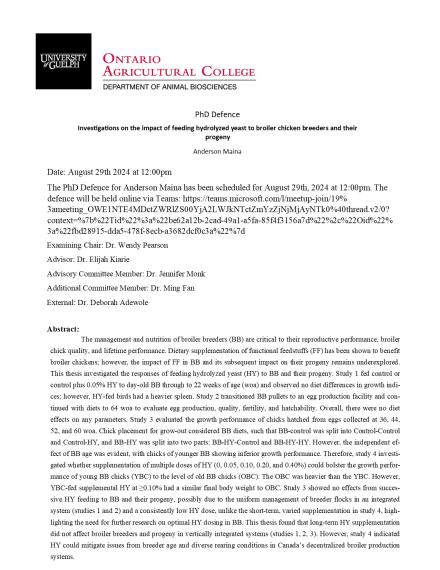Teams: https://teams.microsoft.com/l/meetup-join/19%3ameeting_OWE1NTE4MDctZWRlZS00YjA2LWJkNTctZmYzZjNjMjAyNTk0%40thread.v2/0?context=%7b%22Tid%22%3a%22be62a12b-2cad-49a1-a5fa-85f4f3156a7d%22%2c%22Oid%22%3a%22fbd28915-dda5-478f-8ecb-a3682dcf0c3a%22%7d

Investigations on the impact of feeding hydrolyzed yeast to broiler chicken breeders and their progeny
The management and nutrition of broiler breeders (BB) are critical to their reproductive performance, broiler chick quality, and lifetime performance. Dietary supplementation of functional feedstuffs (FF) has been shown to benefit broiler chickens; however, the impact of FF in BB and its subsequent impact on their progeny remains underexplored. This thesis investigated the responses of feeding hydrolyzed yeast (HY) to BB and their progeny. Study 1 fed control or control plus 0.05% HY to day-old BB through to 22 weeks of age (woa) and observed no diet differences in growth indices; however, HY-fed birds had a heavier spleen. Study 2 transitioned BB pullets to an egg production facility and continued with diets to 64 woa to evaluate egg production, quality, fertility, and hatchability. Overall, there were no diet effects on any parameters. Study 3 evaluated the growth performance of chicks hatched from eggs collected at 36, 44, 52, and 60 woa. Chick placement for grow-out considered BB diets, such that BB-control was split into Control-Control and Control-HY, and BB-HY was split into two parts: BB-HY-Control and BB-HY-HY. However, the independent effect of BB age was evident, with chicks of younger BB showing inferior growth performance. Therefore, study 4 investigated whether supplementation of multiple doses of HY (0, 0.05, 0.10, 0.20, and 0.40%) could bolster the growth performance of young BB chicks (YBC) to the level of old BB chicks (OBC). The OBC was heavier than the YBC. However, YBC-fed supplemental HY at ≥0.10% had a similar final body weight to OBC. Study 3 showed no effects from successive HY feeding to BB and their progeny, possibly due to the uniform management of breeder flocks in an integrated system (studies 1 and 2) and a consistently low HY dose, unlike the short-term, varied supplementation in study 4, highlighting the need for further research on optimal HY dosing in BB. This thesis found that long-term HY supplementation did not affect broiler breeders and progeny in vertically integrated systems (studies 1, 2, 3). However, study 4 indicated HY could mitigate issues from breeder age and diverse rearing conditions in Canada’s decentralized broiler production systems.

